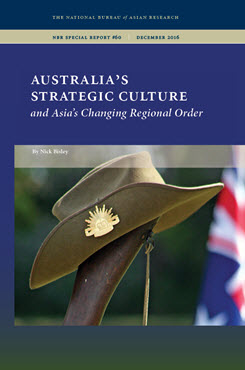NBR Special Report no. 60
Australia's Strategic Culture and Asia's Changing Regional Order
This report examines the mix of anxiety and dependence that drives Australian strategic culture and assesses how it shapes Australian policy.
EXECUTIVE SUMMARY
MAIN ARGUMENT
Military power plays a central role in Australia’s international policy. Even though the country has excellent natural defenses and faces no meaningful geopolitical threat now or in the foreseeable future, support for this position remains strong across the political divide and among the public. As a thinly populated island-continent first established as an outpost of imperial Britain, Australia has a deep sense of vulnerability in its strategic outlook. The strategic culture is shaped by the interplay of anxiety and dependence. Australia has a highly capable military force that is able to defend core interests as well as serve as a means to ensure the support of its ally, the United States, given the perceived vulnerabilities of a country unable to defend its core interests alone. Yet although support for current strategic policy is solid, the narrowness of the strategic policy elite, along with shifts in public opinion, gaps opening up between business interests and security policy, and political disinterest in strategic policy, means that Australian strategic policy cannot be assumed to remain as it is indefinitely.
POLICY IMPLICATIONS
- Given that Australia is a dependable ally with core interests tied up in maintaining the existing strategic balance, the United States can make more political and diplomatic use of the country to help buttress the political foundations of the current order in the face of China’s challenge. This could include working to improve the capacity of structures like the East Asia Summit and the ASEAN Defence Ministers’ Meeting-Plus to support this order.
- Anxiety plays an important role in Australian strategic policy and provides an opportunity for U.S. policymakers to change their calculus when negotiating alliance commitments.
- Emerging trends pose some challenges to the long-term continuity of current approaches. The most important of these are shifts in public opinion and the division between business interests and security policy in relation to China. U.S. policymakers should watch these trends closely for developments and encourage Australian political leaders to explain Australian strategic policy and ensure public support for those choices. They should also ensure that they engage more regularly and systematically with a broader cross section of Australian society than just the narrow security elite.
Nick Bisley is Executive Director of La Trobe Asia and Professor of International Relations at La Trobe University in Australia, where his research focuses on Asia’s international relations, great-power politics, and Australian foreign and defense policy.


